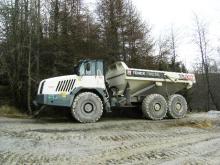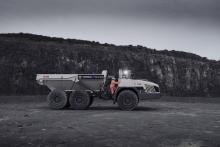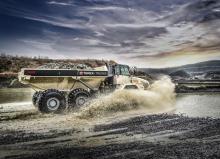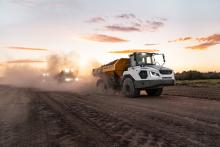A 28-tonne TA300 articulated hauler from Terex Trucks is playing a key role at a major barite mine in the stunning Perthshire region of Scotland. Guy Woodford reports in our sister title Aggregates Business.
Heavy to hold and grey and white in colour, barite is a mineral with an important role to play in the oil and gas industry. When crushed, it forms barium mud which is pumped into oil wells to suppress rising hydrostatic pressure experienced during drilling.
Barhaul, based in Aberfeldy in Perthshire, transports around 36,000 tonnes of barite to customers every year. All the 4.1 tonnes per m³ product belongs to M-I Swaco, an oil-producing company operating in the North Sea off the coast of Aberdeen, over 100 miles away in north-east Scotland.
Having hauled and transported barite by on-highway trucks from Foss Mine, near Aberfeldy, since 1985, Barhaul is preparing to move its operations to Duntanlich Mine, near Ballinluig, around 20 minutes’ drive east from the firm’s HQ. Owned, like Foss Mine, by the Schlumberger Group, a major oilfield services business, whose company portfolio includes M-I Swaco, the site offers far greater and higher grade (4.28 tonnes per m³) barite reserves and many truck-haulage efficiencies. For now, though, a TA300 articulated dump truck (ADT) purchased from Terex Trucks’ dealer TDL Equipment in Coatbridge continues to demonstrate its reliability and durability as Barhaul’s principal Foss Mine hauling model.
“I’ve driven lots of different trucks over more than 20 years, and Terex Trucks haulers are always good quality, reliable machines,” says Dave Ross, Barhaul plant operator at Foss Mine. “I really like the TA300’s independent suspension, which gives you a better ride. I also like the truck’s retarder [a device used to augment or replace some of the functions of primary friction-based braking systems, usually on heavy vehicles].”
Patrick Bradley and a former business partner acquired Barhaul in 1997. Speaking to Aggregates Business about the business’s development, Bradley says: “We are essentially a haulage contractor but linked into that is some plant hire. Over the years we expanded and became a bigger plant hirer but last year we contracted, and the business is now more efficient.
“When I took over here, I inherited two Terex Trucks’ 23-66 (23 tonne) articulated haulers. I then bought two TA25s and then invested in TA27s. I’ve always gone with Terex Trucks. I’ve always found them that bit more economical to purchase, and we’ve never had any major problems with them that would make us change to another manufacturer’s haulers. Terex Trucks people are also always very easy to deal with.”
Emphasising the importance of M-I Swaco to Barhaul, Bradley, an accountant by profession, says trade with the oil producer represents a significant portion of his company’s turnover. The firm also generates revenue from wood chip and other waste haulage backloads, as well as being a Calor Gas distributor.
The barite production process at Foss Mine begins with M-I Swaco personnel executing an agreed drill and blast pattern. Released barite is transported to the surface by underground work-equipped loaders and dumpers where it is tipped onto stockpiles. From there, Barhaul’s haulage work begins, as barite of various size is scooped up by a wheeled loader bucket and poured into the truck body of a Terex Trucks TA300 articulated hauler. Dave Ross then drives the TA300 from the mine head along a 5.5-kilometre (3.4 mile) haul road to the mine’s road end. Here, the articulated hauler’s barite payload is unloaded, creating further stockpiles. A wheeled loader then loads Barhaul’s on-highway Hardox tipper trailers which transport the barite 11 miles to the company’s HQ, where it is crushed by a Rubble Master RM80 electric compact crusher into a final product varying in size from -25mm to dust.
More than 90% of the final barite product is loaded onto on-highway trucks for transport up to M-I Swaco in Aberdeen. The rest is dispatched to either a Schlumberger operation off the coast of Great Yarmouth in Norfolk, East England, or to other customers
in towns such as Caithness in the Scottish Highlands or Buxton in Derbyshire, Central England.
“This year, 100% of the barite will be going up to M-I Swaco in Aberdeen. Mostyears, it’s around 90-95%,” says Bradley.
“M-I Swaco produces around 36,000 tonnes of barite each year. It used to be around 48,000 tonnes a year. Lack of material plus North Sea oil using less barite accounts for that.”
Foss Mine is currently open five days a week, with the Terex Trucks TA300 transporting nine loads of barite each day. Duntanlich Mine has an eight-mile mine head to haul-road road-end route, which means only five barite loads a day are likely to be transported. However, Bradley says he is looking to purchase the latest model of the 38-tonne TA400 ADT from TDL Equipment, with its extra 10-tonne payload enabling far greater volumes of barite to be transported on each haul-road run. Furthermore, a hard-standing area being installed at Duntanlich Mine’s road end will allow the barite to be crushed on-site rather than back at Barhaul HQ, significantly reducing production time.
Designed to increase productivity and profitability, the TA300 is powered by a Scania engine, renowned for high uptime and reliability, proven fuel efficiency and ease of maintenance. The model benefits from selective catalytic reduction (SCR) technology combined with exhaust gas regeneration (EGR) and a variable geometry turbo (VGT).
A proven performer in tough applications, the TA300 is also fitted with an independent front suspension system, an improved powershift transmission and a hydrodynamic retarder for more control during descents. The hauler’s six forward/three reverse transmission provides a maximum forward speed of 32mph (50km/h) and 19mph (30km/h) in reverse.
The TA400 model earmarked for hauling duties at Duntanlich Mine includes Terex Trucks telematics as standard. The truck’s Scania engine enhancements include EU Stage IV emissions compliance and hydraulic systems for optimum control in the most adverse operation conditions. The model also offers operators an improved cab environment, including easier access and exit, and new wider service platforms. The TA400 also provides longer periods between scheduled servicing, lowering operating costs.
Emphasising the importance of hauler durability and reliability to his business, Bradley says: “Our haulers operate in pretty rough conditions most of the year. We get snow from November right through to April, and there can be very heavy winds and rain on the mine site some days.
“With Terex Trucks’ and TDL Equipment people, I find that I know them, and they know me and my drivers. If any driver has anything they want checked out with the hauler, Terex Trucks and TDL Equipment don’t stand on ceremony. They just sort it.”
Following the Schlumberger Group’s imminent start of barite production at Duntanlich mine, Bradley says investing in a TA400 articulated hauler will help his team cope with an increased haulage workload due to the planned significant increase in barite production at the new site.
“The Schlumberger Group expects that in year two after the mine’s purchase, Duntanlich will be producing 60,000 tonnes of barite. Half of that will go to the group’s operation in Aberdeen, while the other half will likely be exported to the United States,” he explains, adding, “The capability of the mine is 110,000 tonnes a year.”
Given the scheduled ramp-up of barite production, Barhaul’s long-term relationship with Terex Trucks and TDL Equipment looks as solid as the mineral itself.








